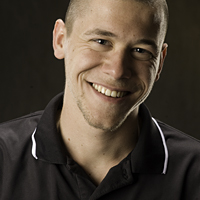
Chemistry Graduate Alexandr Fonari Accepted into Ph.D. Program at Georgia Tech
New Mexico Highlands University graduate student Alexandr Fonari has been accepted into a Ph.D. program at the Georgia Institute of Technology.
Fonari’s studies at Highlands emphasized computational chemistry. Georgia Tech is one of the leading scientific research institutions in the country and has a strong Ph.D. program in computational chemistry.
The 23-year-old Fonari is a native of Moldova, an eastern European country bordered by Romania and Ukraine. In 2009 he earned his bachelor’s degree in physics from the State University of Moldova.
After graduating from college, Fonari attended summer school at the Russian Academy of Sciences in Moscow, working in its X-Ray Structural Center. He met Mikhail Antipin, who directs the center, and has been a visiting chemistry professor at Highlands since 1996.
“I wanted to come to the U.S. to study, because I would have more possibilities here, and scientific research is funded better here than in Eastern Europe,” Fonari said. “My long-term goal is to be a research scientist at one of the national labs in the U.S.”
At Highlands, Fonari is a research assistant in the university’s X-Ray Diffraction Laboratory, using the same state-of-the-art diffractometer he used at the Russian Academy of Sciences. Antipin secured the funding for Highlands’ diffractometer through a grant from the National Science Foundation.
The diffractometer uses X-rays to determine the atomic structure of molecules that have crystallized. Crystallography is a science that studies the forms and structures of crystals.
Fonari used the diffractometer for his X-ray crystallography thesis study.
“My thesis study predicted if the organic materials I analyzed possess the right qualities for light-emitting applications like LED screens for TVs and PCs,” Fonari said. “Now these screens use inorganic materials to light the screens, and generate pictures.”
Antipin is Fonari’s adviser and chaired his thesis committee. Computer science professor Gil Gallegos and visiting chemistry professor David Duval were also on the committee.
“Alexandr is a very talented, smart and focused student who works hard, spending long hours in the lab,” Antipin said. “I can give him a crystal to study and he’s able to work independently in the lab because his research skills are so good.”
He worked on several crystallographic chemistry studies with Antipin and Tatiana Timofeeva, another Highlands University chemistry professor. The studies were published in journals like the European Journal of Medicinal Chemistry and the Journal of Molecular Structure, with Fonari named as a coauthor.
“I’m very thankful for the opportunity to work on research with Dr. Antipin and Dr. Timofeeva,” Fonari said. “The cool thing about a small university is you get to work closely with your professors.”
This won’t be Fonari’s first experience with Georgia Tech. Last summer he worked as an intern in the university’s computational chemistry lab.
Fonari was one of six Highlands University chemistry students placed in research internships in 2010 through funding from Highlands University’s 2009 NSF grant for Partnerships in Research and Education in Materials.
“Our chemistry colleagues at Georgia Tech are impressed with Alexandr,” Antipin said. “I expect him to do well in his Ph.D. program and become a highly successful research scientist.”
Fonari, who is a second-generation scientist, said his mother encouraged him to study science. Marina Fonari earned her Ph.D. in chemistry and is a research scientist at the Moldova Institute of Applied Physics.
